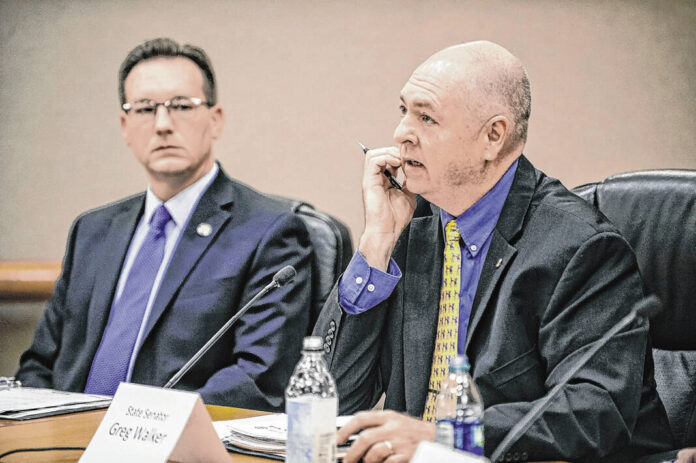
Mike Wolanin | The Republic Rep. Ryan Lauer, R-Columbus, and Sen. Greg Walker, R-Columbus, address issues related to legislation during a Third House session with state legislators in the council chambers at Columbus City Hall in Columbus, Ind., Monday, March 25, 2019.
As Indiana passes the halfway mark of its legislative session, lawmakers are continuing to look at a number of education-related decisions — including whether to strip legal protections from school librarians and providing funds for teachers to receive firearm training.
These two topics, along with others, were discussed by Rep. Ryan Lauer, R-Columbus and Sen. Greg Walker, R-Columbus, at a virtual Third House session Saturday, hosted by the the Columbus Educators’ Association (CEA).
A recording of the session will be uploaded to the CEA YouTube channel, said moderator and association representative Alan Birkemeier. Members of the community were able to register to watch the event live and were also able to submit education-related questions for lawmakers ahead of time.
With the legislative session about halfway over, bills that have passed out of one chamber are now being reviewed by the other.
Senate Bill 12, in particular, is “a bill that has classroom teachers and librarians on edge,” Birkemeier said.
If passed, the bill would remove schools from the list of entities that are eligible for a special defense against criminal prosecutions for disseminating material that is harmful to minors — while at the same time adding colleges and universities to the list of eligible entities. It also removes a defense based on materials being shared for educational purposes.
SB 12 would also establish a procedure for the parent of a student enrolled in a school to submit a complaint that a book in the school’s library is “inappropriate,” as well as a procedure for the school to respond and an appeal procedure.
School boards would also be required to publish a list of all books contained within a school library on the school’s website and make a hard copy of the list available to parents.
The Bartholomew Consolidated School Corp. already has a complaint process for library materials, as well as online catalogs where individuals can search through school library materials.
“Teachers and librarians worry that this bill would lead to some trying to censor or ban materials that are not harmful to minors but merely contain ideas or content with which they personally disagree,” said Birkemeier.
At the local level, discussions around library materials — within both the Bartholomew County Public Library and BCSC schools — have been contentious, with some individuals raising concern about “inappropriate” materials being available to youth, and others criticizing these efforts as censorship. Many of the books in question have dealt with LGBTQ themes or sexual content.
In discussing SB 12, Lauer said that since there is already a complaint process present in schools, and it’s already illegal to distribute harmful and obscene materials to minors, he doesn’t see the bill as making too many significant changes.
“It’s already illegal to provide pornography to minors,” said Lauer. “And so this bill would just emphasize that, that applies even in a school library. It doesn’t ban books. It doesn’t — I’ve read it a couple of times now, and it doesn’t ban the ability for librarians to do their job. And I know a lot of our librarians here in town and appreciate what they do, and honestly, my opinion at this point is this law would not affect them.”
He added that he’s glad it provides a way for parents to give their input.
Walker, who voted for Senate Bill 12, said that rather than inflaming debates about library materials, he sees the legislation as a way to get these discussions under control, with schools having an internal process for complaints.
“When you have folks at a school board meeting and they want to raise a bunch of issues, you can say, ‘Well, by statute, have you talked to the librarian?” he said. “And they say ‘No.’ Well, that ends the conversation, because that’s the first step in the bill, is to have that conversation. And rather than furthering this discontent that arises at a school board meeting, I think you actually get it under control.”
The changes to legal defense merely put schools on an equal playing field with anyone else in the community, he added. He also doesn’t believe the bill would have a “chilling effect” because it doesn’t change the standards for what materials are obscene.
“There is no way that a public defender, or, excuse me, a prosecutor, can bring a case against a school librarian or anyone involved with a school because they think the material is inappropriate, OK?” said Walker. “I want to make that clear. This is an obscenity statute. The only thing that is harmful to minors, by criminal law, is that which is obscene.”
Another bill of note is House Bill 1177, which was authored by Rep. Jim Lucas (R-Seymour). The bill would create “specialized firearms safety, education and training curriculum” for teachers and other school employees, with funds being available from the state to provide for this instruction and for counseling services in the event of a shooting. The identity of any person who participates in firearm training would be kept confidential.
Additionally, the bill states that any “qualified retired law enforcement officer” would be allowed to carry a gun on school grounds.
When asked if he thought this bill has the potential to make schools more or less safe, Walker replied, “I don’t think this moves the needle one way or the other.”
He also stated that there are several decisions that need to be made before an educator decides to have a firearm on school property, and the school corporation has to give its approval for this decision.
“I’ll tell you candidly, our kids are a lot more at risk of being in an automobile accident surrounding a school bus than they are dying from an attack,” said Walker. “And I’m glad it’s not the other way around, but when we talk about school safety, there’s, I think, more higher priorities than how many guns are available within a building.”
Lauer, who voted for HB 1177, noted that Indiana already allows school corporations to authorize teachers to carry firearms for school safety purposes but does not require them to do so. The new bill would simply provide funds for quality training, he said.
“I am in support of this,” he said. “If your community is going to decide that teachers can be part of that safety plan, that we will, the state will support that decision and make sure that these teachers have 40 hours of training. And this is all voluntary; it’s up to the school board if they want to take advantage of this or not.”
He added that while local schools have good relationships with law enforcement and school resource officers, other communities don’t have the same resources.
Other topics discussed by the two lawmakers included various budgeting decisions, career and technical education programs, charter schools, tax caps and the rights of teachers’ unions to discuss working conditions with administrators.




